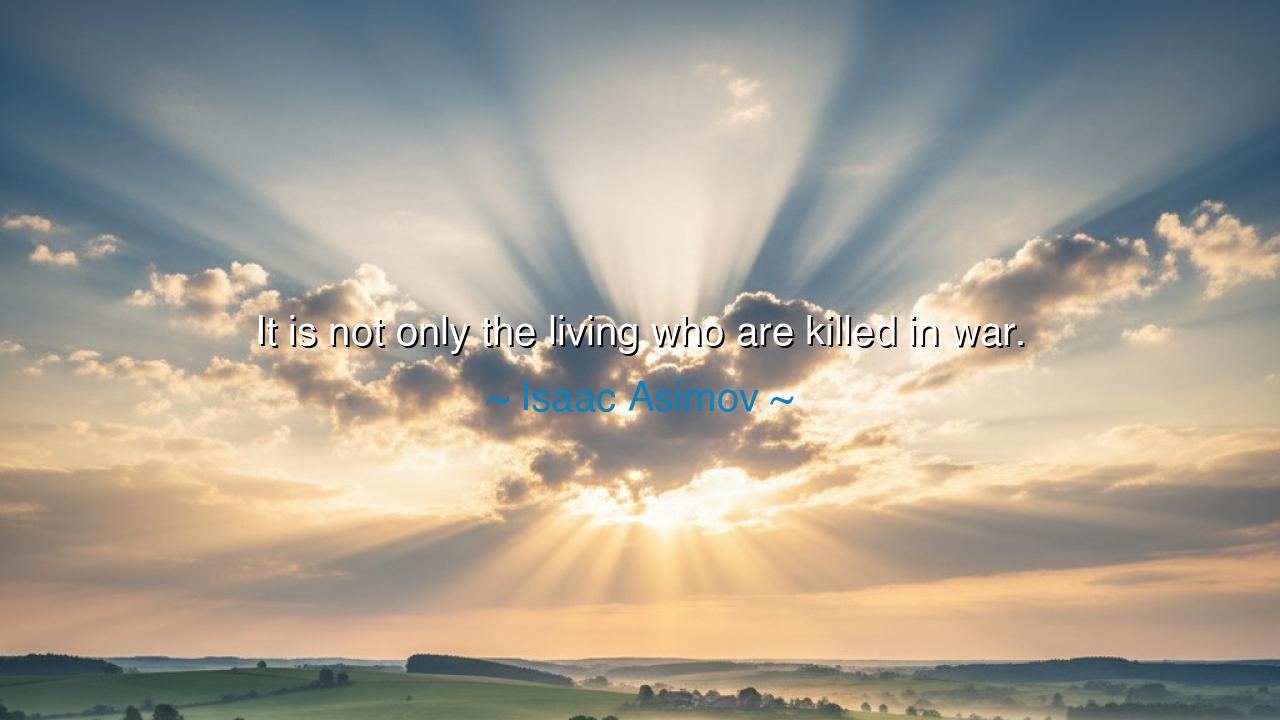
It is not only the living who are killed in war.






Isaac Asimov, though known to the world as a dreamer of galaxies and a weaver of futures, once gave voice to a truth as old as human sorrow: “It is not only the living who are killed in war.” In these words, he reveals that the destruction of battle does not end with the body. For war devours more than flesh — it slays memory, hope, culture, and the very threads of continuity that bind generations. Death marches not only among the soldiers who fall, but among the unborn futures, the silenced voices, the vanished possibilities.
To say that war kills more than the living is to acknowledge the weight of loss beyond the battlefield. A city bombed is not only a graveyard of bodies, but a tomb of art, of knowledge, of heritage. A burned library is a slain civilization. A child who grows up without parents is a broken future. In every trench, in every ruined village, dreams die alongside men. Asimov, who lived through the twentieth century and saw the rise of total war, spoke as one who recognized that humanity kills part of itself when it turns to violence.
History bears his wisdom in blood and ashes. Consider the destruction of the Library of Louvain in Belgium during the First World War. The German army set fire to the ancient university library, consuming centuries of manuscripts, books, and irreplaceable knowledge. No man’s pulse beat in those pages, yet with their burning, a part of humanity’s soul was extinguished. The war did not only kill soldiers in the trenches; it killed memory, it killed continuity, it killed the wisdom of the past meant to guide the future.
Or think of the Holocaust, where millions were slaughtered. Yes, countless living perished in the gas chambers and camps. But beyond those lives, entire lineages were erased. Families that might have thrived, scholars that might have taught, musicians who might have composed, children who might have carried the torch of their ancestors — all were obliterated. Asimov’s words come alive here with tragic force: war does not merely kill the living, it kills the unborn, the unseen, the unfulfilled.
The cruelty of war is also found in the hearts of survivors. Those who live through battle often carry wounds of spirit deeper than wounds of body. Veterans haunted by memories, widows burdened with loneliness, children who inherit silence instead of stories — these too are victims. Though their breath remains, part of their humanity has been slain. In this way, war expands its harvest beyond the battlefield, claiming not only the dead, but the souls of the living.
Asimov’s reflection is thus not only lament, but warning. It reminds us that the cost of war cannot be calculated by counting bodies alone. Its true toll includes the loss of beauty, of knowledge, of future generations, and of the inner light within survivors. To understand this is to realize that no victory can ever justify war’s full price, for what it destroys can never be restored.
The lesson is eternal: guard peace as sacred, for war destroys more than we see. In your own life, resist the spirit of conflict before it hardens into violence. Protect memory, culture, and kindness, for they too are fragile and easily slain. Support leaders who value preservation over conquest, dialogue over destruction. And when you think of war, remember Asimov’s wisdom: its shadow falls not only on the fallen, but on the future itself.






KVTran Khanh Vy
This quote speaks to a deeper truth about war that is often overlooked: its effects linger far beyond the battlefields. The physical deaths are only part of the story. How many people suffer emotionally, or how many cultures are lost forever? How can we ensure that future generations understand the broader consequences of war and avoid repeating the same mistakes? Is it possible to honor the living and the dead without glorifying violence?
XMTran Thi Xuan Mai
Asimov’s quote strikes at the heart of the unspoken tragedies of war. It's not just the lives lost but the entire way of life that is destroyed—families torn apart, communities shattered, and histories erased. What would happen if we could measure the cost of war beyond the immediate casualties? How do we heal from the invisible deaths of identity and culture that war leaves behind?
Ccbt
This quote reminds me of the profound and often ignored consequences of war. It’s easy to think of war in terms of battles and soldiers, but Asimov points out that the dead are not always the ones who lose. The emotional, cultural, and societal destruction lasts long after the fighting stops. Can we ever truly recover from the war, or does it leave an indelible mark that echoes for generations?
TDTruong Dao
Asimov’s words bring a chilling perspective on the devastation of war. It's not just about who dies today, but how future generations are affected by the aftermath—through trauma, loss of culture, and broken communities. How often do we fail to recognize this hidden toll? Could we learn to weigh these costs more heavily before resorting to violence? Is there any way to truly calculate the death of a society in the wake of war?
TLNguyen Thuy Lam
This quote is deeply powerful. It highlights the idea that war doesn’t only affect the living—it also leaves lasting scars on future generations. The destruction of homes, the trauma carried by survivors, and the irreversible changes to communities are all silent casualties. What would it take for societies to truly understand that the costs of war go far beyond just the immediate loss of life?